Table of Contents
- Understanding Why Kittens Bite
- Teaching Bite Inhibition to Your Kitten
- Providing Appropriate Toys and Playtime
- Redirecting Your Kitten’s Biting Behavior
- Consistency in Training Your Kitten
- Using Positive Reinforcement
- Avoiding Physical Punishment
- Seeking Professional Help if Necessary
- Protecting Yourself from Injury
- Patience and Perseverance in Coping with Kitten Biting
Understanding Why Kittens Bite
Kittens are known for their playful and curious nature, but their sharp little teeth can often cause a lot of discomfort and pain. Understanding why kittens bite is the first step towards learning how to cope with this behavior.
Normal Kitten Behavior
It is important to understand that biting is a natural behavior for kittens. Kittens use their mouths to explore their environment, play, and communicate. They also bite as a way to defend themselves or establish dominance over their littermates.
Teething
Just like human babies, kittens go through a teething phase where they need to chew and bite to relieve the discomfort caused by their growing teeth. During this phase, kittens may bite more frequently and with more intensity.
Overstimulation
Kittens are full of energy and can become easily overstimulated. When they reach a certain level of excitement, they may start to bite or scratch. It is important to recognize the signs of overstimulation, such as dilated pupils, twitching tail, and fast breathing, and to give the kitten a break before they become too aggressive.
Fear and Anxiety
Sometimes, kittens may bite as a result of fear or anxiety. For example, if a kitten feels threatened or cornered, they may resort to biting as a way to defend themselves. It is important to create a safe and comfortable environment for your kitten to prevent fear and anxiety.
Understanding the reasons behind your kitten’s biting behavior can help you respond appropriately and effectively. By providing your kitten with a safe and stimulating environment, you can help them develop healthy play and communication habits.
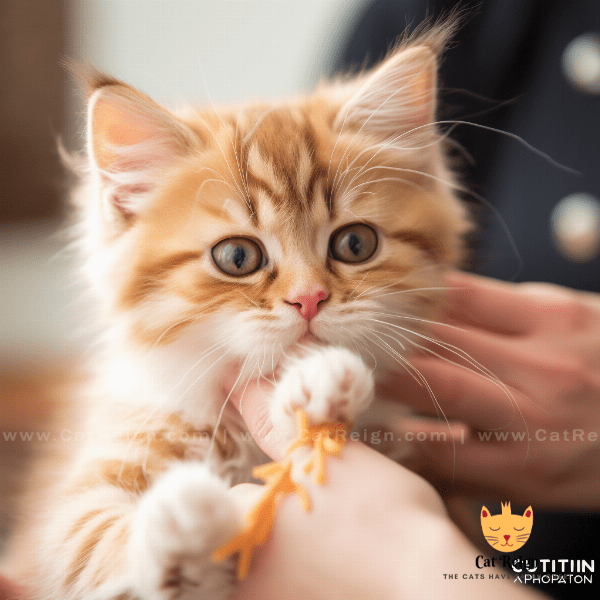
Teaching Bite Inhibition to Your Kitten
Teaching your kitten bite inhibition is an important part of their development. Bite inhibition is the ability to control the force of their bite, which is essential for interacting with people and other animals without causing harm.
Start Early
The best time to start teaching bite inhibition is when your kitten is still young. When your kitten bites too hard, you can make a high-pitched noise or say “ouch” to signal that the bite was too strong. This mimics the way other kittens would react to a painful bite and helps your kitten learn to control the force of their bite.
Consistency is Key
Consistency is important when teaching bite inhibition. It is important to react the same way every time your kitten bites too hard. This helps your kitten learn that biting too hard is not acceptable behavior.
Avoid Punishment
It is important to avoid physical punishment when teaching bite inhibition. Hitting or scolding your kitten can be counterproductive and may cause your kitten to become fearful or aggressive. Positive reinforcement and consistent training are much more effective and humane.
Teaching bite inhibition to your kitten may take time and patience, but it is an important part of their development. By starting early, using positive reinforcement, and being consistent, you can help your kitten develop healthy play habits and avoid causing harm to themselves or others.
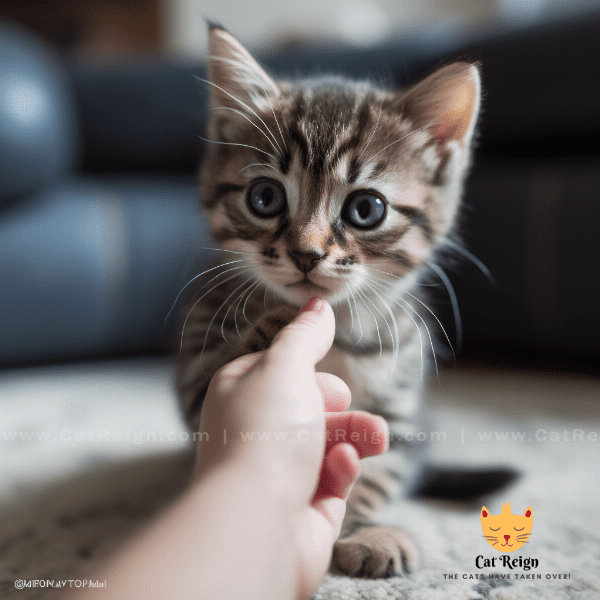
Providing Appropriate Toys and Playtime
Providing appropriate toys and playtime is essential for redirecting your kitten’s biting behavior. By providing them with stimulating and engaging toys, you can help your kitten learn healthy play habits and avoid biting out of boredom or frustration.
Types of Toys
There are many different types of toys that are appropriate for kittens. Toys that can be chased, pounced on, and chewed are ideal. Balls, mice, and wand toys with feathers or string are all great options. It is important to choose toys that are the appropriate size for your kitten and that do not have any small parts that can be swallowed.
Interactive Play
Interactive play is an important part of your kitten’s development. Playing with your kitten using toys can help them develop coordination, social skills, and healthy play habits. It is important to use toys that encourage your kitten to play in a non-aggressive manner, such as chasing or pouncing on toys rather than wrestling or biting.
Scheduled Playtime
Scheduled playtime can also help redirect your kitten’s biting behavior. Kittens have a lot of energy and need frequent play sessions to burn it off. Schedule regular playtime sessions with your kitten, ideally at the same time each day. This will help your kitten develop a routine and avoid biting out of frustration or boredom.
Rotating Toys
Rotating toys can help keep your kitten engaged and avoid boredom. It is important to provide your kitten with a variety of toys and rotate them regularly. This will keep your kitten interested and engaged, and will also help prevent your kitten from becoming too attached to one specific toy.
Providing appropriate toys and playtime is an important part of coping with kitten biting. By choosing the right toys, engaging in interactive play, scheduling playtime, and rotating toys, you can help your kitten develop healthy play habits and avoid biting out of frustration or boredom.
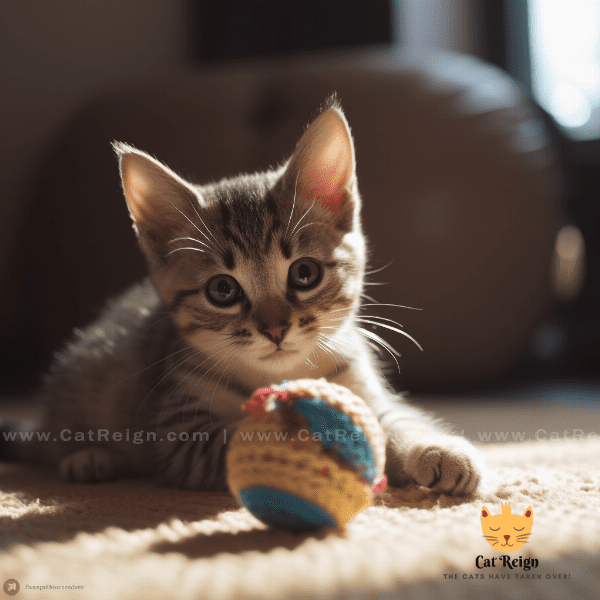
Redirecting Your Kitten’s Biting Behavior
Redirecting your kitten’s biting behavior is an important part of coping with their natural playfulness. By providing appropriate outlets for their energy and redirecting their attention, you can help them develop healthy play habits and avoid biting people or objects that they shouldn’t.
Use Deterrents
Using deterrents can be an effective way to redirect your kitten’s biting behavior. There are a variety of products available, such as bitter sprays or noise deterrents, that can help discourage your kitten from biting people or objects that they shouldn’t. It is important to choose deterrents that are safe for your kitten and that are used consistently.
Offer Alternative Behaviors
Offering your kitten alternative behaviors to biting can help redirect their attention. For example, you can teach your kitten to play with toys instead of biting people or objects. When your kitten starts to bite, redirect their attention to an appropriate toy and encourage them to play with it instead.
Teach Basic Commands
Teaching your kitten basic commands, such as “sit” or “come,” can also be an effective way to redirect their attention. When your kitten starts to bite, use a command to get their attention and redirect them to an appropriate behavior. Over time, your kitten will learn to respond to these commands and will be less likely to bite inappropriately.
Supervise Playtime
Supervising your kitten during playtime can also help redirect their biting behavior. If your kitten starts to bite too hard or becomes too aggressive, you can intervene and redirect their attention. It is important to supervise playtime to ensure that your kitten is playing in a safe and appropriate manner.
Redirecting your kitten’s biting behavior may take time and patience, but it is an important part of their development. By using deterrents, offering alternative behaviors, teaching basic commands, and supervising playtime, you can help your kitten develop healthy play habits and avoid biting people or objects that they shouldn’t.
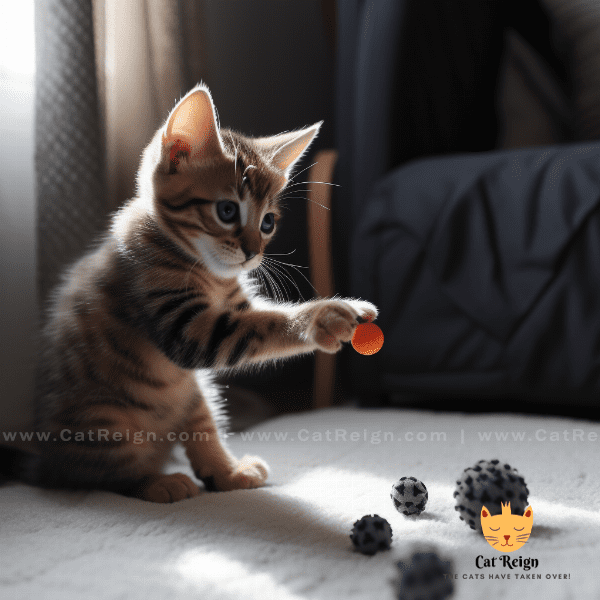
Consistency in Training Your Kitten
Establish Rules
Establishing rules for your kitten is an important part of consistency in training. Decide on what behaviors are acceptable and what behaviors are not, and be consistent in enforcing these rules. For example, if your kitten is not allowed on the kitchen counter, be consistent in preventing them from getting on the counter.
Use Consistent Cues
Using consistent cues can also help with training your kitten. For example, if you use a specific word or phrase to signal that your kitten is biting too hard, use the same word or phrase every time. This will help your kitten understand what is expected of them and will make training more effective.
Involve the Whole Family
Consistency in training is important for everyone in your household. Make sure that everyone is on the same page when it comes to training your kitten and enforcing the rules. This will prevent confusion and make training more effective.
.

Using Positive Reinforcement
Reward Good Behavior
When your kitten exhibits good behavior, such as playing with toys instead of biting people, reward them with praise, petting, or treats. This will reinforce the behavior you want to encourage and make it more likely that your kitten will repeat the behavior in the future.
Ignore Bad Behavior
Ignoring bad behavior can also be an effective way to use positive reinforcement. If your kitten is biting or scratching inappropriately, simply walk away or remove them from the situation. This will teach your kitten that inappropriate behavior is not rewarded with attention or playtime.
Use Small Rewards
Using small rewards, such as a piece of kibble or a quick petting session, can be more effective than large rewards. Small rewards are easier to administer and can be given more frequently, which will help reinforce good behavior more effectively.

Avoiding Physical Punishment
Physical punishment is not an effective or humane way to train your kitten. Using physical punishment, such as hitting or spanking, can cause your kitten to become fearful or aggressive and may lead to more biting behavior. There are more effective and humane ways to train your kitten.
Use Positive Reinforcement
Positive reinforcement is a much more effective way to train your kitten than physical punishment. By rewarding good behavior with praise, petting, or treats, you can help your kitten develop healthy play habits and avoid biting people or objects that they shouldn’t.
Be Patient
Training your kitten may take time and patience, but it is important to be patient and avoid physical punishment. If your kitten is not responding to training, it may be helpful to seek professional help rather than resorting to physical punishment.
Use Alternative Methods
There are many alternative methods for training your kitten that do not involve physical punishment. For example, you can use deterrents or redirect your kitten’s attention when they are exhibiting inappropriate behavior. You can also use training techniques such as clicker training to reinforce good behavior.
Seek Professional Help
Avoiding physical punishment is important for the well-being of your kitten. By using positive reinforcement, being patient, using alternative methods, and seeking professional help if necessary, you can help your kitten develop healthy play habits and avoid biting people or objects that they shouldn’t.
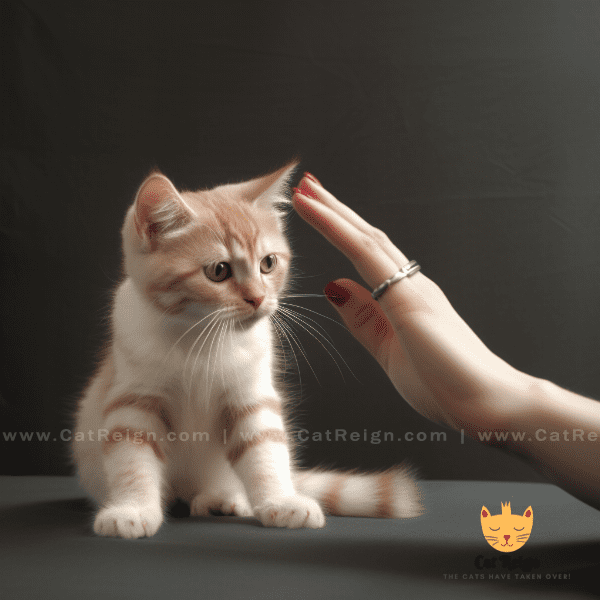
Seeking Professional Help if Necessary
If you are having difficulty coping with your kitten’s biting behavior, it may be helpful to seek professional help. A professional trainer or behaviorist can provide guidance and support to help you develop an effective training plan.
Signs to Look for
There are several signs that may indicate that you need to seek professional help. If your kitten’s biting behavior is becoming more frequent or intense, or if your kitten is exhibiting other aggressive behaviors, such as hissing or growling, it may be time to seek professional help. Additionally, if you are having difficulty training your kitten using positive reinforcement and other methods, a professional may be able to provide additional guidance and support.
Benefits of Professional Help
Seeking professional help can have many benefits. A professional trainer or behaviorist can help you develop an effective training plan tailored to your kitten’s specific needs. They can also provide guidance on how to effectively use positive reinforcement and other training techniques. Additionally, a professional can provide support and guidance throughout the training process, which can be helpful if you are feeling frustrated or overwhelmed.
Finding Professional Help
Finding professional help for your kitten’s biting behavior is relatively easy. You can ask your veterinarian for recommendations, or search for a professional trainer or behaviorist online. It is important to choose a professional who has experience working with kittens and who uses positive reinforcement and other humane training methods.
Seeking professional help is an important step in coping with your kitten’s biting behavior. By recognizing the signs that you may need professional help, understanding the benefits of seeking professional help, and finding a qualified professional, you can help your kitten develop healthy play habits and avoid biting people or objects that they shouldn’t.
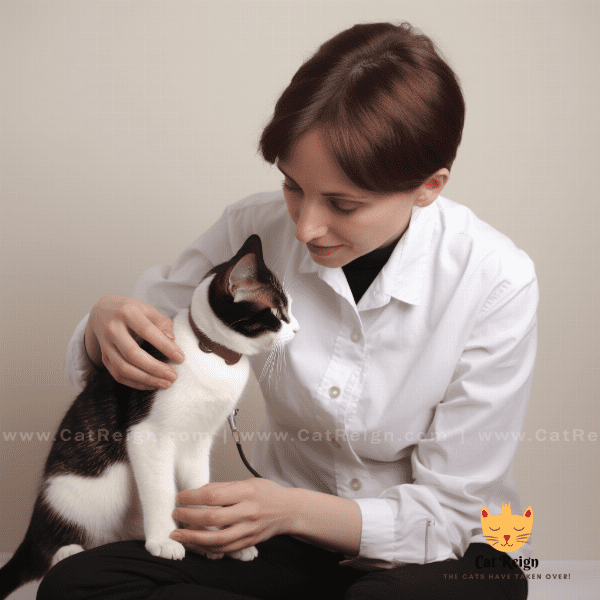
Protecting Yourself from Injury
While training your kitten to avoid biting is important, it is also important to protect yourself from injury in the meantime. Kittens have sharp teeth and claws, and their bites and scratches can be painful and potentially dangerous. Here are some tips for protecting yourself from injury.
Wear Protective Clothing
Wearing protective clothing, such as long sleeves and pants, can help protect your skin from scratches and bites. You can also wear gloves to protect your hands. This is particularly important if you are handling a kitten that is exhibiting aggressive behavior.
Use Toys for Playtime
Using toys for playtime can also help protect you from injury. Kittens have a natural instinct to play and bite, but if you provide them with appropriate toys to bite and scratch, they will be less likely to bite and scratch you. This is especially important if your kitten is exhibiting aggressive behavior.
Avoid Rough Play
Avoiding rough play with your kitten can also help protect you from injury. Kittens have sharp teeth and claws, and rough play can easily lead to scratches and bites. Instead, engage in gentle play with your kitten using appropriate toys.
Be Alert
Being alert and aware of your kitten’s behavior can also help you avoid injury. If your kitten is exhibiting signs of aggressive behavior, such as growling or hissing, it is important to be cautious and avoid handling them until they have calmed down.
Protecting yourself from injury is important when coping with your kitten’s biting behavior. By wearing protective clothing, using toys for playtime, avoiding rough play, and being alert, you can help prevent scratches and bites and ensure a safe and enjoyable experience with your kitten.

Patience and Perseverance in Coping with Kitten Biting
Coping with kitten biting can be a challenging and frustrating experience, but it is important to remain patient and persevere. By using the tips and techniques outlined in this article, you can help your kitten develop healthy play habits and avoid biting people or objects that they shouldn’t.
Understand that Biting is Normal
It is important to understand that biting is a normal behavior for kittens. Kittens have a natural instinct to play and explore, and biting is a way for them to learn about their environment. Understanding this can help you remain patient and avoid becoming frustrated with your kitten’s behavior.
Be Consistent in Your Approach
Consistency is key when it comes to coping with kitten biting. It is important to be consistent in your approach to training and to enforce rules and boundaries consistently. This will help your kitten understand what is expected of them and will make training more effective.
Celebrate Small Victories
Coping with kitten biting can be a long and challenging process, but it is important to celebrate small victories along the way. When your kitten exhibits good behavior or responds positively to training, take the time to celebrate and acknowledge their progress.
Don’t Give Up
Training your kitten to avoid biting may take time and patience, but it is important to persevere and not give up. With time and consistent training, your kitten will develop healthy play habits and avoid biting people or objects that they shouldn’t.
Patience and perseverance are important when coping with kitten biting. By understanding that biting is normal, being consistent in your approach, celebrating small victories, and not giving up, you can help your kitten develop healthy play habits and avoid biting people or objects that they shouldn’t.




